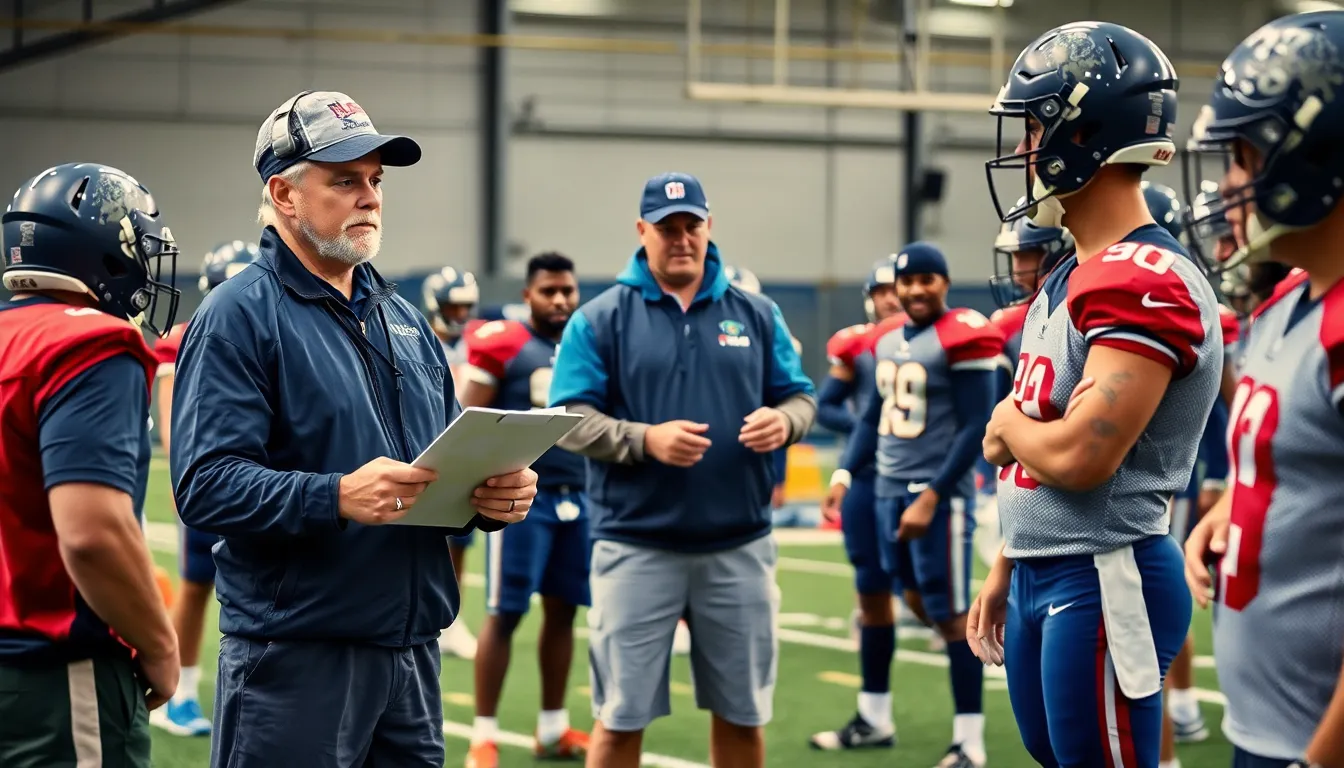Managing a football team is like juggling flaming torches while riding a unicycle—exciting, challenging, and just a tad risky. With players’ egos soaring higher than a last-minute goal, coaches must master the art of diplomacy, strategy, and occasionally, sheer luck. Whether it’s making split-second decisions during a match or navigating the ever-changing dynamics of team morale, effective management can turn a group of talented individuals into a cohesive force on the field.
Table of Contents
ToggleOverview of Football Team Management
Football team management involves coordinating multiple aspects to ensure the team’s success. Coaches focus on player development, utilizing specific strategies to enhance individual skills. Creating a cohesive team culture prioritizes collaboration and communication among players.
Decision-making during matches requires quick thinking and adaptability. Managers analyze game situations, adjusting tactics in real-time to maximize performance. Balancing strategic planning with on-field execution is crucial for achieving desired outcomes.
Effective management also entails cultivating relationships with players. Understanding their motivations and challenges fosters trust and loyalty within the squad. Open dialogue encourages players to express concerns, leading to a more harmonious environment.
Utilizing data analytics can significantly impact training and match strategies. By analyzing player performance metrics, coaches identify strengths and weaknesses, tailoring training sessions accordingly. Monitoring these statistics over time helps gauge progress and refine tactics.
Incorporating sports psychology further enhances team management. Addressing players’ mental well-being contributes to overall performance, reducing stress during high-pressure situations. Engaging with sports psychologists can provide valuable insights and coping strategies for players.
Efficient resource allocation is another essential function of football team management. Budgeting for salaries, training facilities, and travel expenses ensures financial sustainability. Strategic investments lead to long-term success, enabling teams to compete effectively at higher levels.
Key Roles in Football Team Management

Effective football team management involves various critical roles that contribute to overall success. Each position carries unique responsibilities that help in achieving team goals.
Head Coach Responsibilities
The head coach directs the team’s strategy and overall performance. Developing training programs that enhance skills is a key aspect of this role. Making tactical decisions during matches impacts game outcomes significantly. Building team culture through leadership fosters trust among players. Establishing effective communication channels ensures everyone is aligned with the game plan. Analyzing performance data aids in refining tactics for future matches.
Assistant Coaches and Their Roles
Assistant coaches support the head coach in training and game preparation. Specializing in particular areas, such as offense or defense, they provide focused advice to players. Conducting drills that enhance specific skills is a vital part of their job. Offering feedback during practices helps refine player development. Collaborating with the head coach on game tactics ensures a cohesive strategy. Their contribution to player motivation can elevate team morale significantly.
Managerial Staff Importance
Managerial staff plays a supportive role in football team management overall. Coordinating logistics such as travel and accommodations allows players to focus on performance. Managing budgets ensures financial resources are allocated efficiently. They streamline communication between players and management, fostering a positive environment. Assisting with talent scouting enriches team composition. Understanding compliance with league regulations maintains the team’s standing and reputation.
Effective Strategies for Team Management
Implementing effective strategies in football team management involves several key components. Strong focus on training and development programs enhances player skills and builds a solid foundation for team cohesion.
Training and Development Programs
Regular training sessions focus on skill enhancement and physical conditioning. Coaches design tailored programs that address individual player needs and overall team objectives. Development workshops foster communication and collaboration among players, promoting a unified approach to gameplay. Incorporating varied drills and tactics aids adaptability during matches, allowing players to respond effectively to different situations. Continuous feedback from coaches also plays a pivotal role, encouraging players to refine their technique and improve performance.
Performance Analysis and Metrics
Utilizing performance analysis and metrics provides crucial insights into player and team effectiveness. Coaches evaluate match footage to identify strengths and weaknesses in gameplay. Advanced statistics, such as passing accuracy or distance covered, measure player contributions objectively. Regular assessments help pinpoint areas for improvement, resulting in targeted training methods. Incorporating data analytics fosters strategic adaptation during matches, enhancing game strategies in real-time. Overall, understanding these metrics helps in making informed decisions that drive team success.
Challenges in Football Team Management
Managing a football team involves navigating various challenges that can impact overall performance and harmony.
Player Relations and Conflict Resolution
Navigating player relations is crucial in team management. Strong relationships among players foster a positive environment, but conflicts can arise due to competition for positions or differing personalities. Understanding each player’s motives helps in addressing issues effectively. Developing open communication channels encourages players to express concerns. Implementing team-building activities promotes camaraderie, reducing friction. Additionally, timely mediation during disputes can prevent escalations, ensuring focus remains on performance. Managers must also engage in active listening, demonstrating empathy to build trust.
Financial Management and Budgeting
Financial management presents significant challenges in football team management. Establishing a strategic budget ensures sustainability and long-term success. Allocating resources wisely impacts salaries, training facilities, and player acquisitions. Managing expenses for travel and equipment is equally vital. Continuous monitoring of financial performance allows for adjustments based on revenue fluctuations. Engaging in sponsorship deals and partnerships can enhance financial stability, providing additional funding. Ultimately, intentional financial strategies support not only operational needs but also the team’s competitive edge.
Future Trends in Football Team Management
Management in football is evolving rapidly. Coaches and staff increasingly adopt innovative approaches to stay competitive.
Technology Integration
Emerging technologies play a vital role in football team management. Use of data analytics allows teams to analyze player performance in real time. Wearable technology provides insights on player health and fitness, enabling tailored training programs. Augmented reality can enhance training by simulating game scenarios, improving players’ decision-making skills. Virtual reality offers immersive experiences, helping players refine their techniques in a controlled environment. Adoption of these technologies enhances not only player performance but also overall team strategies during matches.
Evolving Player Expectations
Players’ expectations continue to shift, reflecting changing dynamics in the sport. Athletes demand more from their teams, seeking personalized development plans that cater to individual skills. Emotional intelligence plays a crucial role in maximizing potential, as understanding player motivations fosters a supportive environment. Players increasingly desire transparency in decision-making processes, highlighting the need for coaches to communicate strategies effectively. Furthermore, a focus on mental well-being and work-life balance is rising, prompting management to address these factors within their organization. Adapting to these expectations is essential for building trust and loyalty within the team.
Effective football team management requires a multifaceted approach that blends strategy with strong interpersonal relationships. Managers must navigate the complexities of player dynamics while fostering a cohesive team culture. Emphasizing communication and adaptability enables teams to thrive both on and off the field.
As the landscape of football continues to evolve, embracing innovative technologies and prioritizing player well-being will be crucial. By focusing on data-driven decision-making and financial sustainability, managers can ensure their teams remain competitive. Ultimately, successful football management hinges on the ability to unite diverse talents into a harmonious and high-performing unit.




